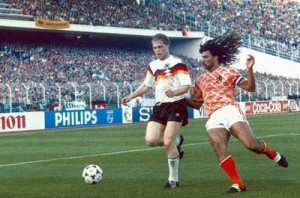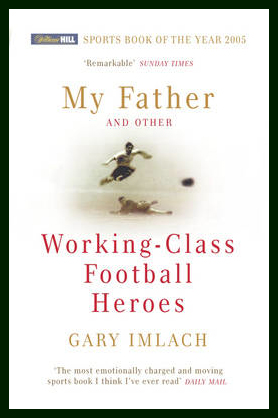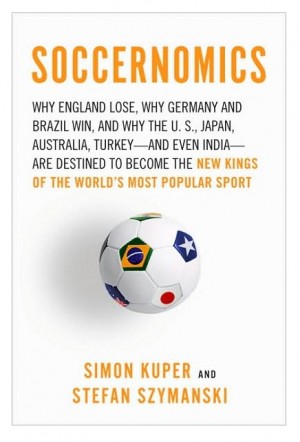Out of wide array of matches being played and televised today (a bunch of international friendlies, a few South American World Cup qualifying matches, and the final four qualifying playoff matches for Euro 2012), the one to watch is a friendly in Hamburg:
Germany-Netherlands (2:30pmET, ESPN Classic, ESPN3.com): It’s not really a friendly between these two national sides. True, this match is worth watching based just on the fact that these two are among the top handful of national sides around right now, and will be the top challengers to unseat Spain as European champions next summer. But in addition to current form, there’s the history to consider.
It’s a history that on the pitch goes back to the famous 1974 match in Munich, which resulted in (then West) Germany’s first second World Cup title, via a loss that still looms large in the Dutch national memory.
The Oranje got some revenge in 14 years later, beating Germany in the Euro 1988 semifinal, in a match which like today’s took place in Hamburg, on their way to their only major title. Those two matches got caught up, especially in the Dutch psyche, with a previous, darker history–that of Nazi Germany’s occupation of Holland during World War II.
Two chapters to read for much much more on the Holland-Germany rivalry, and in particular on the legendary 1974 and 1988 matches and their complicated historical context: Chapter 2 of Dutchman Simon Kuper’s Football Against the Enemy, titled “Football Is War”; and Chapter 13 of David Winner’s brilliant Brilliant Orange book, titled “football is not war.” (At least read them before next summer. If things go according to form, it’s entirely possible these two could meet in yet another Euro semifinal, or perhaps even in the final.)
Remarkably the entire Euro 1988 semifinal Hamburg match is on YouTube, in 10 parts. Though the last segment ends with the final whistle, and so doesn’t include Ronald Koeman infamously wiping his backside with German midfielder Olaf Thon’s jersey in front of the visiting Dutch fans after swapping shirts. The description of the YouTube videos does include this quote attributed to Koeman: “1988 didn’t erase 1974 from our memories. The bitterness is still there. Before the match Rinus Michels, who also coached the 1974 squad, told us about that lost final, in order to motivate us. I regret what I did after the match. It was an impulsive reaction, the kind of stupid reaction that follows you for the rest of your life. But for me that case is closed. As I never met Thon again after that, I never had the occasion to apologize.” Apparently, upon returning to Amsterdam as Euro champions after defeating the Soviet Union in the final and following a water-born parade thru the canals of the city, Michels said to the massive crowd gathered in Dam Square: “We won the tournament, but we all know that the semi-final was the real final.”
If instead of the Germany-Holland “friendly” you’d rather watch some matches that ostensibly “matter”, the four Euro playoff 2nd leg matches are all on ESPN3.com:



